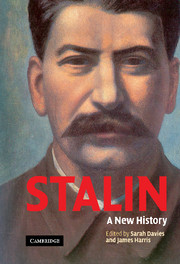Book contents
- Frontmatter
- Contents
- Notes on contributors
- Preface
- A note on transliteration
- Glossary
- 1 Joseph Stalin: power and ideas
- 2 Stalin as Georgian: the formative years
- 3 Stalin as Commissar for Nationality Affairs, 1918–1922
- 4 Stalin as General Secretary: the appointments process and the nature of Stalin's power
- 5 Stalin as Prime Minister: power and the Politburo
- 6 Stalin as dictator: the personalisation of power
- 7 Stalin as economic policy-maker: Soviet agriculture, 1931–1936
- 8 Stalin as foreign policy-maker: avoiding war, 1927–1953
- 9 Stalin as Marxist: the Western roots of Stalin's russification of Marxism
- 10 Stalin as Bolshevik romantic: ideology and mobilisation, 1917–1939
- 11 Stalin as patron of cinema: creating Soviet mass culture, 1932–1936
- 12 Stalin as producer: the Moscow show trials and the construction of mortal threats
- 13 Stalin as symbol: a case study of the personality cult and its construction
- 14 Stalin as the coryphaeus of science: ideology and knowledge in the post-war years
- Index
10 - Stalin as Bolshevik romantic: ideology and mobilisation, 1917–1939
Published online by Cambridge University Press: 24 November 2009
- Frontmatter
- Contents
- Notes on contributors
- Preface
- A note on transliteration
- Glossary
- 1 Joseph Stalin: power and ideas
- 2 Stalin as Georgian: the formative years
- 3 Stalin as Commissar for Nationality Affairs, 1918–1922
- 4 Stalin as General Secretary: the appointments process and the nature of Stalin's power
- 5 Stalin as Prime Minister: power and the Politburo
- 6 Stalin as dictator: the personalisation of power
- 7 Stalin as economic policy-maker: Soviet agriculture, 1931–1936
- 8 Stalin as foreign policy-maker: avoiding war, 1927–1953
- 9 Stalin as Marxist: the Western roots of Stalin's russification of Marxism
- 10 Stalin as Bolshevik romantic: ideology and mobilisation, 1917–1939
- 11 Stalin as patron of cinema: creating Soviet mass culture, 1932–1936
- 12 Stalin as producer: the Moscow show trials and the construction of mortal threats
- 13 Stalin as symbol: a case study of the personality cult and its construction
- 14 Stalin as the coryphaeus of science: ideology and knowledge in the post-war years
- Index
Summary
Speaking at the Eighteenth Party Congress in 1939, Stalin argued that Marxist-Leninist ideology lay at the centre of Soviet politics:
There is hardly any need to dwell on the serious importance of Party propaganda, of the Marxist-Leninist education [vospitanie] of our workers [rabotnikov] … It must be accepted as an axiom that the higher the political level and the Marxist-Leninist consciousness of workers in any branch of state or Party work the better and more fruitful will be the work itself … and, conversely, the lower the political level of the workers, and their Marxist-Leninist consciousness, the more probable will be disruption and failure in work, the more probable will it be that workers will become superficial and that they will degenerate into pragmatists and pedants [deliagi-krokhobory], the more likely their [complete] degeneration.
The significance and meaning of statements such as this have been the subject of disagreement among historians of Stalinism. Why did Stalin, a leader so frequently denounced by his rivals as a mediocre theorist, pay so much attention to the role of ideas in politics? What was the relationship between ideas and Stalin's political behaviour? And what was the nature of the ‘Marxist-Leninist’ ideology he claimed to be so committed to?
It used to be common to assume that Stalin was indulging in empty rhetoric and that he had little interest in political ideas. For some, Stalin was best seen as a typical modernising state-builder, a pragmatist whose commitment to Marxism was ‘skin-deep’.
- Type
- Chapter
- Information
- StalinA New History, pp. 181 - 201Publisher: Cambridge University PressPrint publication year: 2005

